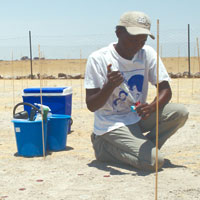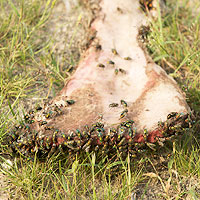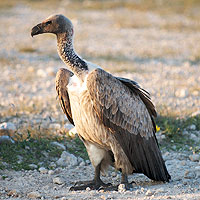

Holly Ganz
Assistant Research Specialist
 Master's degree student, Duduzile Sibanda pipetting zebra blood in experimental plots |
Email: hganz@nature.berkeley.edu |
Research
My research interests include the ecology and evolution of species interactions and how these interactions affect the evolution of life history traits, particularly host susceptibility and parasite virulence.
 Blow flies may help transmit spores to hosts.
Blow flies may help transmit spores to hosts.
| I am currently part of a team of researchers from the Getz lab who are studying anthrax in a community of herbivores in Etosha National Park in Namibia. As part of this research program, I am studying Bacillus anthracis, the causative agent of anthrax, focusing on three main areas: |
Whether or not B. anthracis has a life cycle in the soil has long been the subject of speculation. It was recently shown that B. anthracis spores germinate in association with the roots of fescue grass. I am currently conducting field and laboratory experiments to test whether a native grass provides nutrients that promote B. anthracis germination and multiplication. Using microarrays developed by collaborators at Lawrence Berkeley National Laboratory, I am also characterizing seasonal changes in the diversity of microbes in the soil. This will allow me to address whether B. anthracis is able to coexist within the microbial community and how seasonal changes may contribute to the timing of disease outbreaks.
|
 White-backed vulture (Gyps africanus) White-backed vulture (Gyps africanus) |
Blowflies are thought to play an important role in transmission of spores from a carcass site to plants that are fed upon by hosts. I am supervising a master’s student from the University of Namibia who will study the role of flies in dispersing spores from a carcass site. In collaboration with scientists at Stellenbosch University, South Africa, we will use electric nets to sample the flies at different carcass sites to explore their relative role in transmission in Etosha National Park (Namibia) and comparative sites such as Kruger National Park (South Africa) and Malilangwe Wildlife Reserve (Zimbabwe).
In collaboration with geneticists at the University of Hohenheim, Germany and Northern Arizona University, USA, I am exploring whether observed seasonal differences in the timing of disease outbreaks in zebra and elephant populations are attributable to strain-type variation of B. anthracis.

